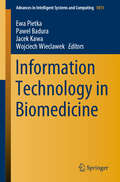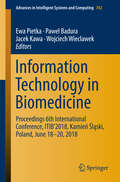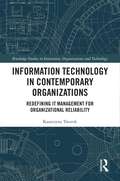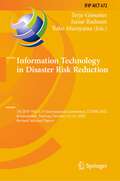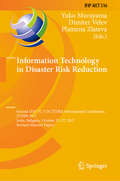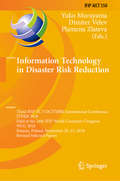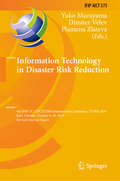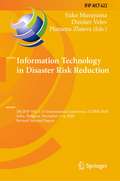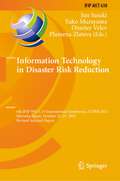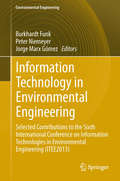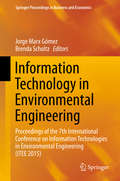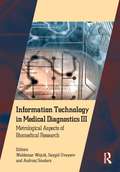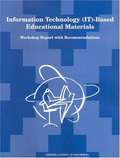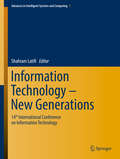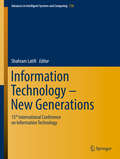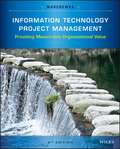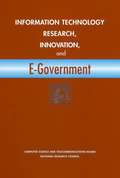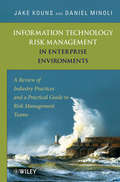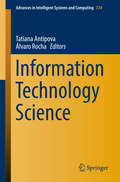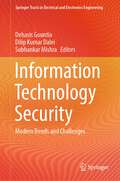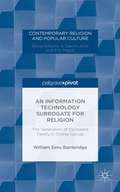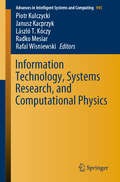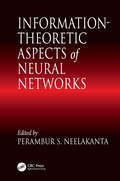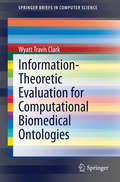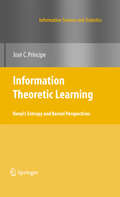- Table View
- List View
Information Technology in Biomedicine: Proceedings 6th International Conference, Itib'2018 Kamieski, Poland June 18-20 2018 (Advances in Intelligent Systems and Computing #1011)
by Pawel Badura Jacek Kawa Wojciech Wieclawek Ewa PietkaThis book provides a comprehensive overview of advances in the field of medical data science, presenting carefully selected articles by leading information technology experts. Information technology, as a rapidly evolving discipline in medical data science, with significant potential in future healthcare, and multimodal acquisition systems, mobile devices, sensors, and AI-powered applications has redefined the optimization of clinical processes. This book features an interdisciplinary collection of papers that have both theoretical and applied dimensions, and includes the following sections: Medical Data Science Quantitative Data Analysis in Medical Diagnosis Data Mining Tools and Methods in Medical Applications Image Analysis Analytics in Action on SAS Platform Biocybernetics in Physiotherapy Signal Processing and Analysis Medical Tools & Interfaces Biomechanics and Biomaterials. As such, it is a valuable reference tool for scientists designing and implementing information processing tools used in systems that assist clinicians in patient care. It is also useful for students interested in innovations in quantitative medical data analysis, data mining, and artificial intelligence.
Information Technology in Biomedicine: Proceedings 6th International Conference, ITIB’2018, Kamień Śląski, Poland, June 18–20, 2018 (Advances in Intelligent Systems and Computing #762)
by Ewa Pietka Pawel Badura Jacek Kawa Wojciech WieclawekITiB’2018 is the 6th Conference on Information Technology in Biomedicine, hosted every two years by the Department of Informatics & Medical Devices, Faculty of Biomedical Engineering, Silesian University of Technology. The Conference is organized under the auspices of the Committee on Biocybernetics and Biomedical Engineering of the Polish Academy of Sciences. The meeting has become an established event that helps to address the demand for fast and reliable technologies capable of processing data and delivering results in a user-friendly, timely and mobile manner. Many of these areas are recognized as research and development frontiers in employing new technology in the clinical setting. Technological assistance can be found in prevention, diagnosis, treatment, and rehabilitation alike. Homecare support for any type of disability may improve standard of living and make people’s lives safer and more comfortable. The book includes the following sections: Ø Image Processing Ø Multimodal Imaging and Computer-aided Surgery Ø Computer-aided Diagnosis Ø Signal Processing and Medical Devices Ø Bioinformatics Ø Modelling & Simulation Ø Analytics in Action on the SAS Platform Ø Assistive Technologies and Affective Computing (ATAC)
Information Technology in Contemporary Organizations: Redefining IT Management for Organizational Reliability (Routledge Studies in Innovation, Organizations and Technology)
by Katarzyna TworekDue to tremendous shifts in the business environment of contemporary organizations following the COVID-19 pandemic, there is a need to redefine the role and importance of information technology (IT) support, which is essential for ensuring an organization’s survival. Current models are no longer valid, as in the new turbulent and digitalized environment, the need for IT support is more crucial and indispensable than ever. This book proposes a new model explaining the factors inf luencing the efficiency of adaptable IT support in contemporary organizations, including those operating normally and during crises. The author demonstrates how organizations benefit from IT support, not only by enabling higher performance but also by facilitating organizational continuity, reliability, and even survival during various stages of crisis. The proposed model provides a basis for theory development in the field of organizational continuity and reliability, offering a new body of knowledge related to the factors boosting organizational performance gained from IT support and enabling organizational survival. This book will provide valuable findings for scholars performing research in the field of IT use in organizations, IT management, crisis management, and organizational reliability.
Information Technology in Disaster Risk Reduction: 7th IFIP WG 5.15 International Conference, ITDRR 2022, Kristiansand, Norway, October 12–14, 2022, Revised Selected Papers (IFIP Advances in Information and Communication Technology #672)
by Terje Gjøsæter Jaziar Radianti Yuko MurayamaThis volume constitutes the refereed and revised post-conference proceedings of the 7th IFIP WG 5.15 International Conference on Information Technology in Disaster Risk Reduction, ITDRR 2022, held in Kristiansand, Norway, in October 2022.The 23 full papers presented were carefully reviewed and selected from 33 submissions. The papers focus on various aspects and challenges of coping with disaster risk reduction. The papers are categorized in the following topical subheadings: strategic disaster risk reduction; situational awareness; telecommunications, sensors and drones; collaborative emergency management; cybersecurity and privacy; earthquake and climate forecasting; social media analytics; community resilience.
Information Technology in Disaster Risk Reduction: First Ifip Tc 5 Dcdrr International Conference, Itdrr 2016, Sofia, Bulgaria, November 16-18,, 2016, Revised Selected Papers (IFIP Advances in Information and Communication Technology #501)
by Yuko Murayama Dimiter Velev Plamena ZlatevaThis volume constitutes the refereed post-conference proceedings of the Second IFIP TC 5 DCITDRR International Conference on Information Technology in Disaster Risk Reduction, ITDRR 2017, held in Sofia, Bulgaria, in October 2017. <P><P> The 16 revised full papers presented were carefully reviewed and selected from 43 submissions. The papers focus on various aspects and challenges of coping with disaster risk reduction. The main topics include areas such as natural disasters, big data, cloud computing, Internet of Things, mobile computing, emergency management, disaster information processing, and disaster risk assessment and management.
Information Technology in Disaster Risk Reduction: Third IFIP TC 5 DCITDRR International Conference, ITDRR 2018, Held at the 24th IFIP World Computer Congress, WCC 2018, Poznan, Poland, September 20–21, 2018, Revised Selected Papers (IFIP Advances in Information and Communication Technology #550)
by Yuko Murayama Dimiter Velev Plamena ZlatevaThis volume constitutes the refereed post-conference proceedings of the Third IFIP TC 5 DCITDRR International Conference on Information Technology in Disaster Risk Reduction, ITDRR 2018, held as part of the 24th IFIP World Computer Congress, WCC 2018, in Poznan, Poland, in September 2018.The 12 revised full papers presented were carefully reviewed and selected from 32 submissions. The papers focus on various aspects and challenges of coping with disaster risk reduction. The main topics include areas such as natural disasters, big data, cloud computing, Internet of Things, mobile computing, emergency management, disaster information processing, and disaster risk assessment and management.
Information Technology in Disaster Risk Reduction: 4th IFIP TC 5 DCITDRR International Conference, ITDRR 2019, Kyiv, Ukraine, October 9–10, 2019, Revised Selected Papers (IFIP Advances in Information and Communication Technology #575)
by Yuko Murayama Dimiter Velev Plamena ZlatevaThis volume constitutes the refereed and revised post-conference proceedings of the 4th IFIP TC 5 DCITDRR International Conference on Information Technology in Disaster Risk Reduction, ITDRR 2019, in Kyiv, Ukraine, in October 2019. The 17 full papers and 2 short papers presented were carefully reviewed and selected from 53 submissions. The papers focus on various aspects and challenges of coping with disaster risk reduction. The main topics include areas such as natural disasters, big data, cloud computing, Internet of Things, mobile computing, emergency management, disaster information processing, and disaster risk assessment and management.
Information Technology in Disaster Risk Reduction: 5th IFIP WG 5.15 International Conference, ITDRR 2020, Sofia, Bulgaria, December 3–4, 2020, Revised Selected Papers (IFIP Advances in Information and Communication Technology #622)
by Yuko Murayama Dimiter Velev Plamena ZlatevaThis volume constitutes the refereed and revised post-conference proceedings of the 5th IFIP WG 5.15 International Conference on Information Technology in Disaster Risk Reduction, ITDRR 2020, in Sofia, Bulgaria, in December 2020.* The 18 full papers and 6 short papers presented were carefully reviewed and selected from 52 submissions. The papers focus on various aspects and challenges of coping with disaster risk reduction. The main topics include areas such as natural disasters, remote sensing, big data, cloud computing, Internet of Things, mobile computing, emergency management, disaster information processing, disaster risk assessment and management. *The conference was held virtually.
Information Technology in Disaster Risk Reduction: 6th IFIP WG 5.15 International Conference, ITDRR 2021, Morioka, Japan, October 25–27, 2021, Revised Selected Papers (IFIP Advances in Information and Communication Technology #638)
by Jun Sasaki Yuko Murayama Dimiter Velev Plamena ZlatevaThis volume constitutes the refereed and revised post-conference proceedings of the 6th IFIP WG 5.15 International Conference on Information Technology in Disaster Risk Reduction, ITDRR 2021, in Morioka, Japan, in October 2021. The 11 full papers presented were carefully reviewed and selected from 18 submissions. The papers focus on various aspects and challenges of coping with disaster risk reduction. The papers are categorized in the following topical subheadings: Information Analysis for Situation Awareness; Evacuation and Rescue; COVID-19 Issues; and IT Use for Risk and Disaster Management.
Information Technology in Environmental Engineering
by Burkhardt Funk Peter Niemeyer Jorge Marx GómezInformation technologies have evolved to an enabling science for natural resource management and conservation, environmental engineering, scientific simulation and integrated assessment studies. Computing plays a significant role in the every day practices of environmental engineers, natural scientists, economists, and social scientists. The complexity of natural phenomena requires interdisciplinary approaches, where computing science offers the infrastructure for environmental data collection and management, scientific simulations, decision support, documentation and reporting. Ecology, environmental engineering and natural resource management comprise an excellent real-world testbed for IT system demonstration, while presenting new challenges for computer science Complexity, uncertainty and scaling issues of natural systems constitute a demanding application domain for modelling, simulation and scientific workflows, data management and reporting, decision support and intelligent systems, distributed computing environments, geographical information systems, heterogeneous systems integration, software engineering, accounting systems, control systems, as well as sustainable manufacturing and reverse logistics. This books offers a collection of papers presented at the 6th International Conference on Environmental Engineering, held in July 2013, in Lüneburg, Germany. Recent success stories in ecoinformatics, promising ideas and new challenges are discussed among computer scientists, environmental engineers, industrial engineers, economists and social scientists, demonstrating new paradigms for problem solving and decision making.
Information Technology in Environmental Engineering
by Jorge Marx Gómez Brenda ScholtzThis book presents new concepts as well as practical applications and experiences in the field of information technology for environmental engineering. The book has three main focus areas: firstly, it shows how information technologies can be employed to support natural resource management and conservation, environmental engineering, scientific simulation and integrated assessment studies. Secondly, it demonstrates the application of computing in the everyday practices of environmental engineers, natural scientists, economists and social scientists. And thirdly, it demonstrates how the complexity of natural phenomena can be approached using interdisciplinary methods, where computer science offers the infrastructure needed for environmental data collection and management, scientific simulations, decision support documentation and reporting. The book collects selected papers presented at the 7th International Symposium on Environmental Engineering, held in Port Elizabeth, South Africa in July 2015. It discusses recent success stories in eco-informatics, promising ideas and new challenges from the interdisciplinary viewpoints of computer scientists, environmental engineers, economists and social scientists, demonstrating new paradigms for problem-solving and decision-making.
Information Technology in Medical Diagnostics III: Metrological Aspects of Biomedical Research
by Waldemar WójcikThe science of biomedical measurements is experiencing a period of rapid development. Biomedical measuring systems are becoming increasingly accurate on the one hand and complex on the other. In order to make progress in this field, metrological problems must be solved using a systemic and formal approach. To this end, it is necessary to define the components of the system and the rules for their interaction, which allows the creation of a mathematical model. In this way, any technology or object can be presented in the form of a structure on which the necessary estimates can be formulated and synthesis, including metrological one, can be made. The authors have observed that despite the significance of the problem, few scientific centres deal with this issue in a generalised manner. Hence the idea of bringing together the achievements of the centres from Russia, Poland and Kazakhstan in one joint publication. The first and second volumes of Information Technology in Medical Diagnostics found readers not only in Poland, Ukraine, and Kazakhstan but also Spain, Russia and the Czech Republic. Following the readers’ suggestions, in the third volume of ITMD we returned to the formula of closed chapters known from volume one. Due to its limited volume, the book deals with the aforementioned issues in only selected areas of biomedical engineering. The book will be of interest not only for academics and engineers but also for professionals involved in biomedical engineering, seeking solutions for the problems that cannot be solved using "traditional" technologies or trying to improve existing measurement systems.
Information Technology (IT)-Based Educational Materials: Workshop Report with Recommendations
by Committee on Achieving Compatibility in IT-Based Educational MaterialsIn the last half-century, we have witnessed the birth and development of a new era: the information age. Information Technology (IT), the primary vehicle of the information age, has transformed the modern workplace and is pervasive in the development of new knowledge and wealth. IT has also dramatically influenced our capacity to educate. Yet, the application of IT in education has been disorganized and uneven. Pockets of innovation in localized environments are thriving, but the promise of open access, greatly enhanced teaching and learning, and large-scale use has not been realized. IT-Based Educational Materials: Workshop Report with Recommendations identifies critical components that support the development and use of IT-based educational materials. The report points to three high priority action areas that would produce a transitional strategy from our fragmented environment to an IT-transformed future in engineering education--Build Community; Create Organizational Enablers; and Coordinate Action. The report outlines six recommendations, including a call to establish a national laboratory to carry out evidenced-based investigations and other activities to insure interoperability and effective teaching and learning. The report stresses the need to pursue open architectures and to engage multidisciplinary researchers, including social scientists and others who address the transformation of faculty cultures. The report also discusses the need to engage users and developers of the IT-products in activities that are driven by student learning outcomes.
Information Technology - New Generations
by Shahram LatifiThis volume presents a collection of peer-reviewed, scientific articles from the 14th International Conference on Information Technology - New Generations, held at the University of Nevada at Las Vegas on April 10-12, at Tuscany Suites Hotel in Las Vegas. The Book of Chapters addresses critical areas of information technology including web technology, communications, computing architectures, software engineering, security, and data mining.
Information Technology - New Generations: 14th International Conference On Information Technology (Advances In Intelligent Systems And Computing #558)
by Shahram LatifiThis volume presents a collection of peer-reviewed, scientific articles from the 15th International Conference on Information Technology – New Generations, held at Las Vegas. The collection addresses critical areas of Machine Learning, Networking and Wireless Communications, Cybersecurity, Data Mining, Software Engineering, High Performance Computing Architectures, Computer Vision, Health, Bioinformatics, and Education.
Information Technology Project Management: Providing Measurable Organizational Value
by Jack MarchewkaThe 5th Edition of Jack Marchewka's Information Technology Project Management focuses on how to create measurable organizational value (MOV) through IT projects. The author uses the concept of MOV, combined with his own research, to create a solid foundation for making decisions throughout the project's lifecycle. <p><p> The book's integration of project management and IT concepts provides students with the tools and techniques they need to develop in this field.
INFORMATION TECHNOLOGY RESEARCH, INNOVATION, and E-Government
by Committee on Computing Communications Research to Enable Better Use of Information Technology in GovernmentGovernments have done much to leverage information technology to deploy e-government services, but much work remains before the vision of e-government can be fully realized. Information Technology Research, Innovation, and E-government examines the emerging visions for e-government, the technologies required to implement them, and approaches that can be taken to accelerate innovation and the transition of innovative information technologies from the laboratory to operational government systems. In many cases, government can follow the private sector in designing and implementing IT-based services. But there are a number of areas where government requirements differ from those in the commercial world, and in these areas government will need to act on its role as a “demand leader.” Although researchers and government agencies may appear to by unlikely allies in this endeavor, both groups have a shared interest in innovation and meeting future needs.E-government innovation will require addressing a broad array of issues, including organization and policy as well as engineering practice and technology research and development, and each of these issues is considered in the book.
Information Technology Risk Management in Enterprise Environments
by Jake Kouns Daniel MinoliDiscusses all types of corporate risks and practical means of defending against them.Security is currently identified as a critical area of Information Technology management by a majority of government, commercial, and industrial organizations.Offers an effective risk management program, which is the most critical function of an information security program.
Information Technology Science (Advances In Intelligent Systems And Computing #724)
by Tatiana Antipova Álvaro RochaThis book includes a selection of articles from the 2017 International Conference on Information Technology Science (MosITS’17), held on December 1-3, 2017, at the Izmailovo Convention Centre, Moscow, Russia.MosITS’17 was an international forum for researchers and practitioners to present and discuss the most recent innovations, trends, results, experiences and concerns in various areas of information technology science.The papers cover topics such as information technology in communication, management science, public administration, economics, business & finance, history, health & rehabilitation, education, and in architecture.
Information Technology Security: Modern Trends and Challenges (Springer Tracts in Electrical and Electronics Engineering)
by Debasis Gountia Dilip Kumar Dalei Subhankar MishraThis book focuses on current trends and challenges in security threats and breaches in cyberspace which have rapidly become more common, creative, and critical. Some of the themes covered include network security, firewall security, automation in forensic science and criminal investigation, Medical of Things (MOT) security, healthcare system security, end-point security, smart energy systems, smart infrastructure systems, intrusion detection/prevention, security standards and policies, among others. This book is a useful guide for those in academia and industry working in the broad field of IT security.
An Information Technology Surrogate for Religion: The Veneration of Deceased Family in Online Games
by William Sims BainbridgeThis book demonstrates principles of Ancestor Veneration Avatars (AVAs), by running avatars based on eleven deceased members of one family through ten highly diverse virtual worlds from the violent Defiance to the intellectual Uru: Myst Online, from the early EverQuest to the recent Elder Scrolls Online.
Information Technology, Systems Research, and Computational Physics (Advances in Intelligent Systems and Computing #945)
by Piotr Kulczycki Janusz Kacprzyk László T. Kóczy Radko Mesiar Rafal WisniewskiThis book highlights a broad range of modern information technology tools, techniques, investigations and open challenges, mainly with applications in systems research and computational physics. Divided into three major sections, it begins by presenting specialized calculation methods in the framework of data analysis and intelligent computing. In turn, the second section focuses on application aspects, mainly for systems research, while the final section investigates how various tasks in the basic disciplines—mathematics and physics—can be tackled with the aid of contemporary IT methods. The book gathers selected presentations from the 3rd Conference on Information Technology, Systems Research and Computational Physics (ITSRCP'18), which took place on 2–5 July 2018 in Krakow, Poland. The intended readership includes interdisciplinary scientists and practitioners pursuing research at the interfaces of information technology, systems research, and computational physics.
Information-Theoretic Aspects of Neural Networks
by P. S. NeelakantaInformation theoretics vis-a-vis neural networks generally embodies parametric entities and conceptual bases pertinent to memory considerations and information storage, information-theoretic based cost-functions, and neurocybernetics and self-organization. Existing studies only sparsely cover the entropy and/or cybernetic aspects of neural information.Information-Theoretic Aspects of Neural Networks cohesively explores this burgeoning discipline, covering topics such as:Shannon information and information dynamicsneural complexity as an information processing systemmemory and information storage in the interconnected neural webextremum (maximum and minimum) information entropyneural network trainingnon-conventional, statistical distance-measures for neural network optimizationssymmetric and asymmetric characteristics of information-theoretic error-metricsalgorithmic complexity based representation of neural information-theoretic parametersgenetic algorithms versus neural informationdynamics of neurocybernetics viewed in the information-theoretic planenonlinear, information-theoretic transfer function of the neural cellular unitsstatistical mechanics, neural networks, and information theorysemiotic framework of neural information processing and neural information flowfuzzy information and neural networksneural dynamics conceived through fuzzy information parametersneural information flow dynamicsinformatics of neural stochastic resonanceInformation-Theoretic Aspects of Neural Networks acts as an exceptional resource for engineers, scientists, and computer scientists working in the field of artificial neural networks as well as biologists applying the concepts of communication theory and protocols to the functioning of the brain. The information in this book explores new avenues in the field and creates a common platform for analyzing the neural complex as well as artificial neural networks.
Information-Theoretic Evaluation for Computational Biomedical Ontologies
by Wyatt Travis ClarkThe development of effective methods for the prediction of ontological annotations is an important goal in computational biology, yet evaluating their performance is difficult due to problems caused by the structure of biomedical ontologies and incomplete annotations of genes. This work proposes an information-theoretic framework to evaluate the performance of computational protein function prediction. A Bayesian network is used, structured according to the underlying ontology, to model the prior probability of a protein's function. The concepts of misinformation and remaining uncertainty are then defined, that can be seen as analogs of precision and recall. Finally, semantic distance is proposed as a single statistic for ranking classification models. The approach is evaluated by analyzing three protein function predictors of gene ontology terms. The work addresses several weaknesses of current metrics, and provides valuable insights into the performance of protein function prediction tools.
Information Theoretic Learning
by Jose C. PrincipeThis book presents the first cohesive treatment of Information Theoretic Learning (ITL) algorithms to adapt linear or nonlinear learning machines both in supervised or unsupervised paradigms. ITL is a framework where the conventional concepts of second order statistics (covariance, L2 distances, correlation functions) are substituted by scalars and functions with information theoretic underpinnings, respectively entropy, mutual information and correntropy. ITL quantifies the stochastic structure of the data beyond second order statistics for improved performance without using full-blown Bayesian approaches that require a much larger computational cost. This is possible because of a non-parametric estimator of Renyi's quadratic entropy that is only a function of pairwise differences between samples. The book compares the performance of ITL algorithms with the second order counterparts in many engineering and machine learning applications. Students, practitioners and researchers interested in statistical signal processing, computational intelligence, and machine learning will find in this book the theory to understand the basics, the algorithms to implement applications, and exciting but still unexplored leads that will provide fertile ground for future research.
